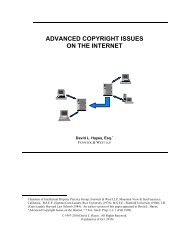Paramount Pictures Corporation v. ReplayTV, Inc., Joint Stipulation ...
Paramount Pictures Corporation v. ReplayTV, Inc., Joint Stipulation ...
Paramount Pictures Corporation v. ReplayTV, Inc., Joint Stipulation ...
You also want an ePaper? Increase the reach of your titles
YUMPU automatically turns print PDFs into web optimized ePapers that Google loves.
12345678910111213141516171819202122232425262728percipient witnesses, while simultaneously concealing the identities of these samewitnesses from the other side.Yet that is precisely what Defendants propose to do. Defendants haverefused to produce names and contact information for the individuals (customersand testers) who use or have used the <strong>ReplayTV</strong> 4000, asserting that production ofthat information would supposedly violate those individuals’ “ right of privacy” andthat the information is supposedly irrelevant. 47/Defendants have offered only asham “ compromise” on this issue, which they are fully aware would, at best,provide Plaintiffs with access to the identities of only a small and unrepresentativefraction of <strong>ReplayTV</strong> 4000 users. 48/In light of Defendants’ refusal to produce this information, Plaintiffs askedDefendants to assure them that Defendants themselves would not use the names andaddresses of those witnesses to gather any evidence in the case -- whether directlyor though an outside survey firm. To Plaintiffs’ amazement, Defendants haverefused to provide this assurance. Instead, Defendants have insisted on a grosslyone-sided arrangement in which Defendants can easily gather evidence from theindividuals who use the <strong>ReplayTV</strong> 4000, but Plaintiffs effectively have no ability todo so. Not only is this position utterly unfair, it makes no sense: if the identities ofthe people who use the <strong>ReplayTV</strong> are irrelevant, as Defendants claim, they shouldreadily agree that they will not use that “ irrelevant” information to gather evidence.Defendants have contended that the production of this information wouldsomehow violate the privacy rights of their testers and customers. As discussedabove (at note [15]), that position is mistaken.48/Defendants’ absurd “ compromise” proposal is this: Defendants would asktheir customers and testers if they wished to be contacted by Plaintiffs, and if anycustomers so agreed, Defendants would forward their names and addresses toPlaintiffs. Defendants obviously appreciate that few, if any, individuals are likelyto volunteer in response to such an inquiry. And even if a few individuals did,Plaintiffs would be at a tremendous disadvantage because Defendants would haveaccess to the complete group of customers and testers, while Plaintiffs would haveaccess only to a self-selected (and undoubtedly unrepresentative) fraction of thegroup.47/63
















